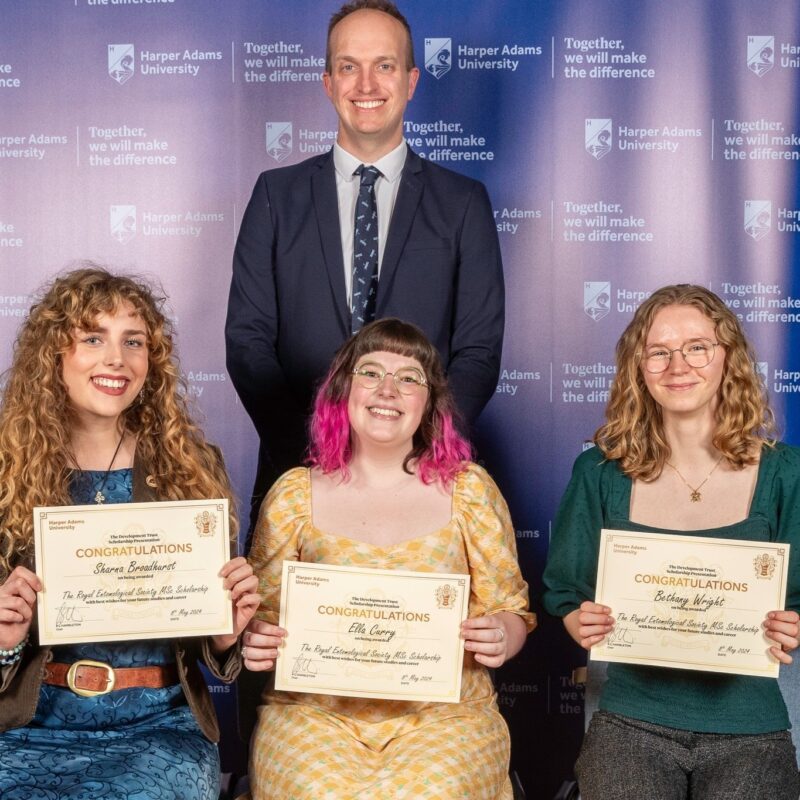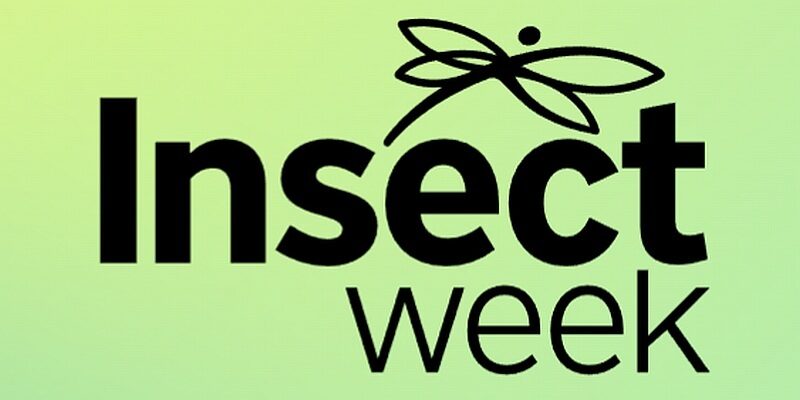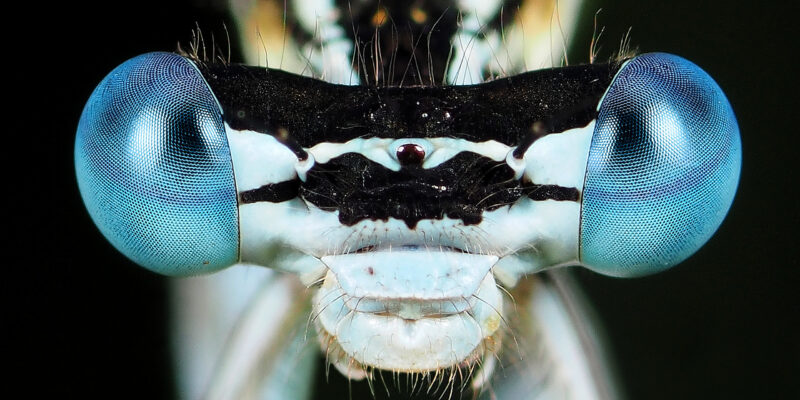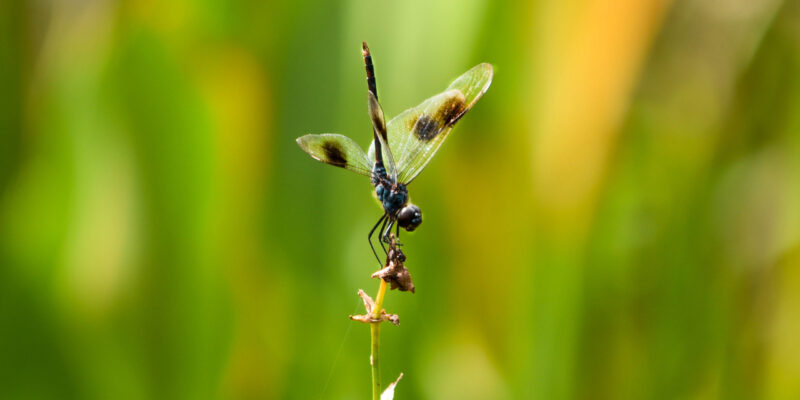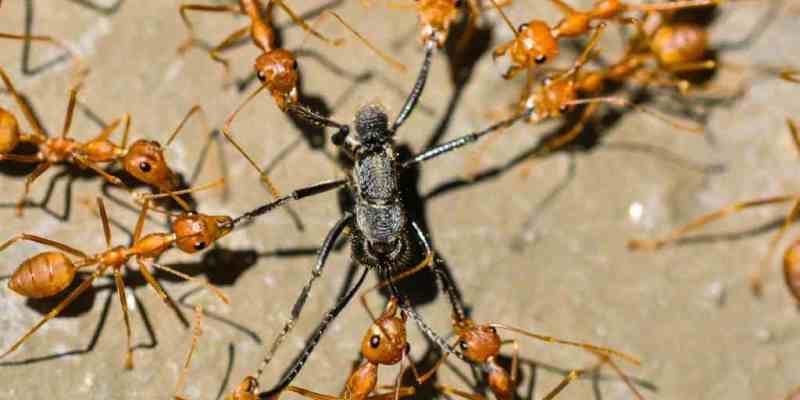We’re proud to welcome new RES entomology scholars at Harper Adams University.
The Royal Entomological Society supports three Master’s student scholarships every year, following a rigorous application process. This year’s winners introduce themselves and explain what the award means to them.
Join us in congratulating Sharna Broadhurst, Ella Curry and Bethany Wright on their RES MSc scholarships.
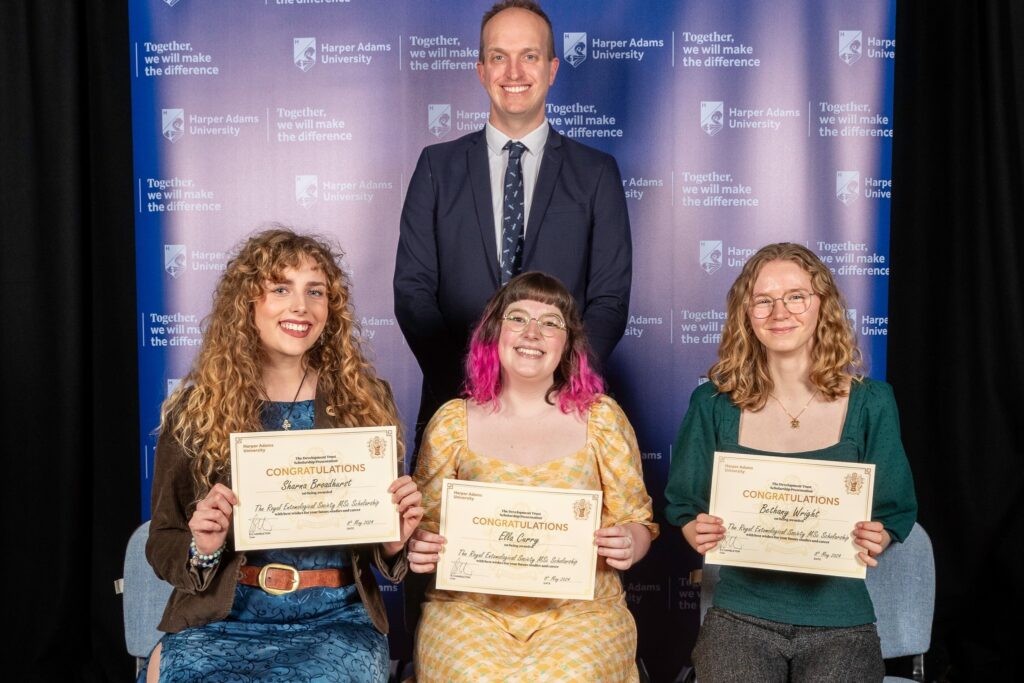
Sharna Broadhurst
“I haven’t always loved insects, but when my tutors taught us about forensic entomology during my BSc Forensic Science at UCLAN, I was astonished that these little creatures could reveal so much about the circumstances surrounding a person’s death. For my dissertation, I combined my interest in forensic entomology and bloodstain pattern analysis to analyse the differences between fly artefacts made by the blow fly Protophormia terranovae when they spread blood around a crime scene with perpendicular blood spatter. While rearing my flies, I felt elated just standing and watching them in their different life stages. I decided that there was no other option than to study an MSc in entomology. This was solidified when visiting the Forensic Anthropology Research Facility in Texas (the body farm) and seeing the diverse array of insects making themselves at home in a vessel that used to be someone else’s home.
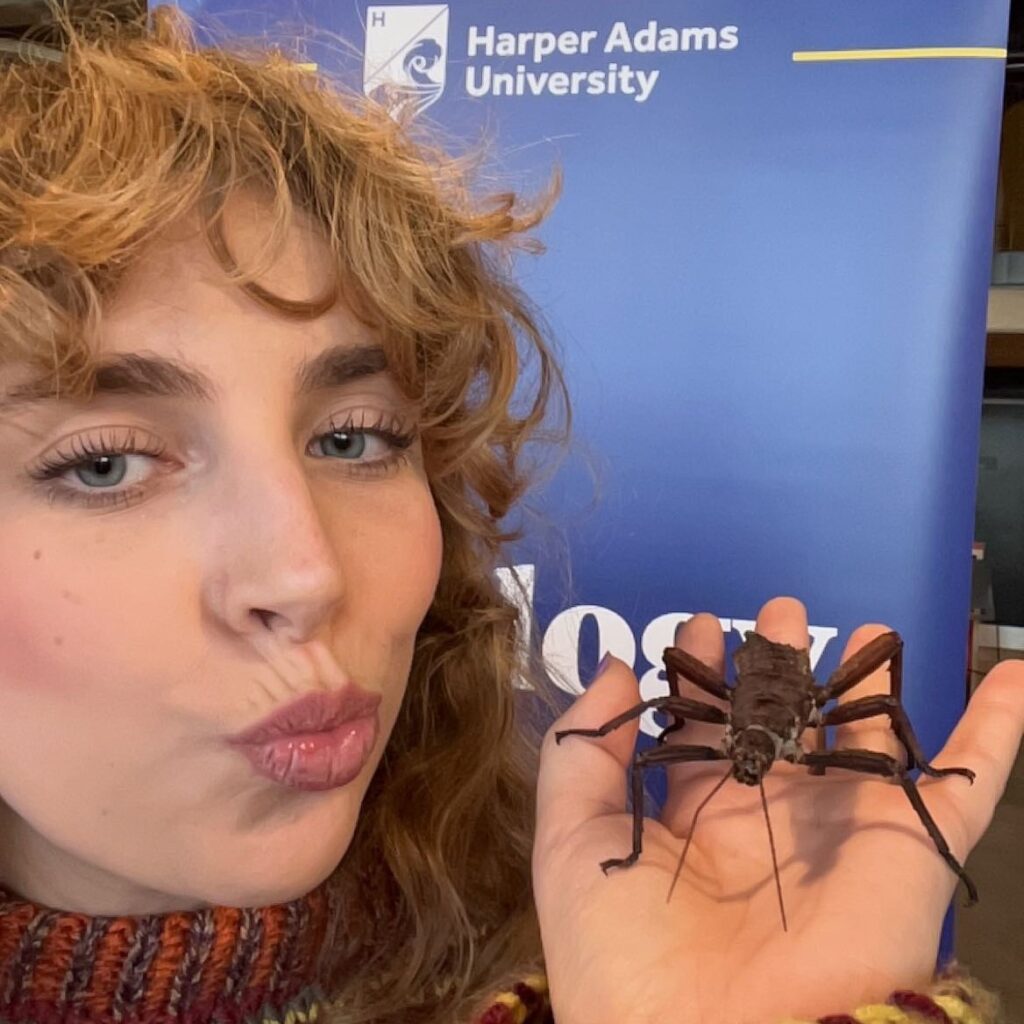
Since coming to Harper Adams, I have realised how important insects are for the world. They make up 90% of the Earth’s animals and deserve recognition. Being part of a generation taught from a young age about climate change and told that the job is ours to heal a world we didn’t wound is difficult. However, knowing that I am studying possibly one of the most important groups of animals and trying to find solutions is incredibly important. I have particularly enjoyed catching and identifying insects and learning about alternatives to pesticides using natural enemies. I am incredibly thankful to the Royal Entomological Society for facilitating this by providing me with a scholarship, which has allowed me to dedicate more time to achieving this goal. I have always been a victim of impostor syndrome, but being awarded the scholarship, the support from the amazing staff at Harper Adams and the wonderful friends I have met have given me confidence and assured me that I made the right decision.
For my master’s research project, I have decided to pursue my interest in forensic entomology and utilise the olfactory learning of Bombus terrestris to detect rat cadavers using the proboscis extension reflex (PER) assay. Hopefully, you are envisioning little sniffer bees in yellow high-vis jackets with ‘POLICE’ printed in big letters on the back. Bees, wasps and moths have been used to detect explosives and have even been taught to play football. My idea is that if they are capable of learning to associate a specific odour profile with decaying matter of human or animal origin, we could attach a tracker to them to locate the remains for use in forensic cases or mass disasters.
I am still deciding what career path I want to take, but I will be travelling around Europe and Australia for a year to gain some world experience and learn what is important. I am incredibly excited about what’s to come and advise you to follow your passions, and that it’s never too late to start caring about insects!”
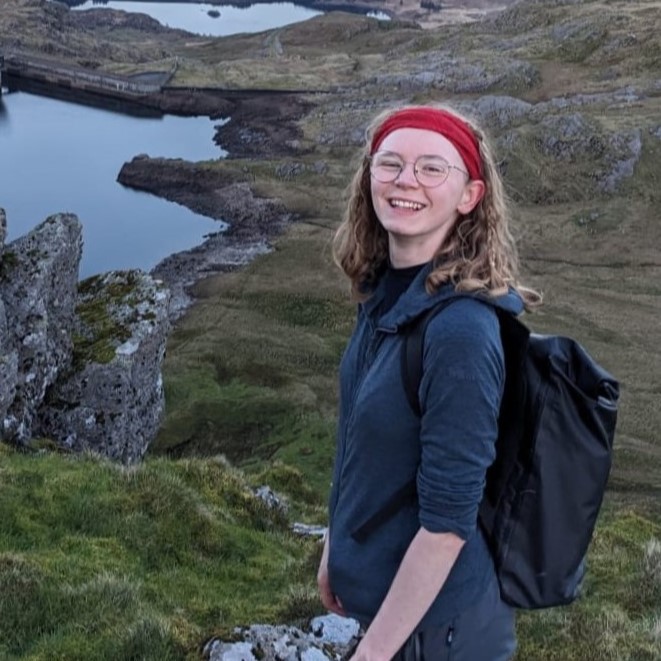
Bethany Wright
“Having grown up loving wildlife and being outdoors, it is embarrassing to admit I had not
heard of entomology until 2022. Even after completing (and thoroughly enjoying) my BSc in
Environmental Science at Aberystwyth University, I did not know what sort of nature career I
wanted. However, during three months of volunteering at Beinn Eighe NNR in the Highlands,
I met a group of entomologists working for the Darwin Tree of Life Project. Their insect
interests were visible for everyone to see: from their wash bags and jewellery to their
conversations and competitions to list all the insect Orders at dinner. The passion they had
for their work and the bizarre knowledge it gave them was utterly intriguing and everything I
was looking for as a career. So, while completing an online entomology diploma later that
year, I applied to study MSc Entomology at Harper Adams.
The RES MSc Entomology Scholarship has given me the financial ability to not only do MSc
Entomology at Harper Adams, but also to have the financial freedom to do the course full-time without working in other industries. This freedom was particularly important to me as it has meant I can fully focus on my studies and take every opportunity to go into the field, attend events, gain experiences, and make contacts. Learning to drive will be the icing on the cake, as there are so many wonderful locations where I can now realistically dream of doing fieldwork.
My main priority after graduating is gaining professional fieldwork and research experience
in ecological entomology. I have always enjoyed the physicality of fieldwork, and I am very
excited to start balancing the physical and mental aspects. The identification process really
appeals to me as I love anatomy, particularly now that Harper has given me an
understanding of invertebrate evolution and adaptation. I am happy to learn and work with
any insect group, but Odonata have a special place in my heart, causing me to always be
watching the skies and searching for exuviae around small bodies of water. I am particularly
interested in Britain’s temperate rainforests, and I am working to understand better how
invertebrates might be used to indicate these mystical and understudied habitats. Preserving
and expanding these historical rainforests is crucial, so I also hope to get involved in habitat
conservation. A few years down the line, I would love to do an entomology PhD, but first I
look forward to getting some work experience to build my knowledge and confidence as an
entomologist.”
Ella Curry
“I have adored all things arthropod from a young age – I held my first tarantula at age three, dressed as a spider for costume day at preschool, and since I could walk could be found grubbing about in the garden or forest with woodlice, snails, beetles, and everything in between. Before the age of ten I had ant farms, worm farms, caterpillars and Australian spiny stick insects, and my avid reading of ‘bug books’ meant I supplied endless ‘bug facts’ to willing listeners. My entomological interests evolved during my time at Cambridge University, where I took part in moth and arthropod biodiversity surveying and volunteered at the Cambridge University Museum of Zoology – despite my first degree being English! I then worked for several amazing months at Dr Beynon’s Bug Farm in Wales (and couldn’t resist adopting 50 adorable Lucihormetica verrucosa cockroaches when I left) and my mind was made up – I had to study entomology.
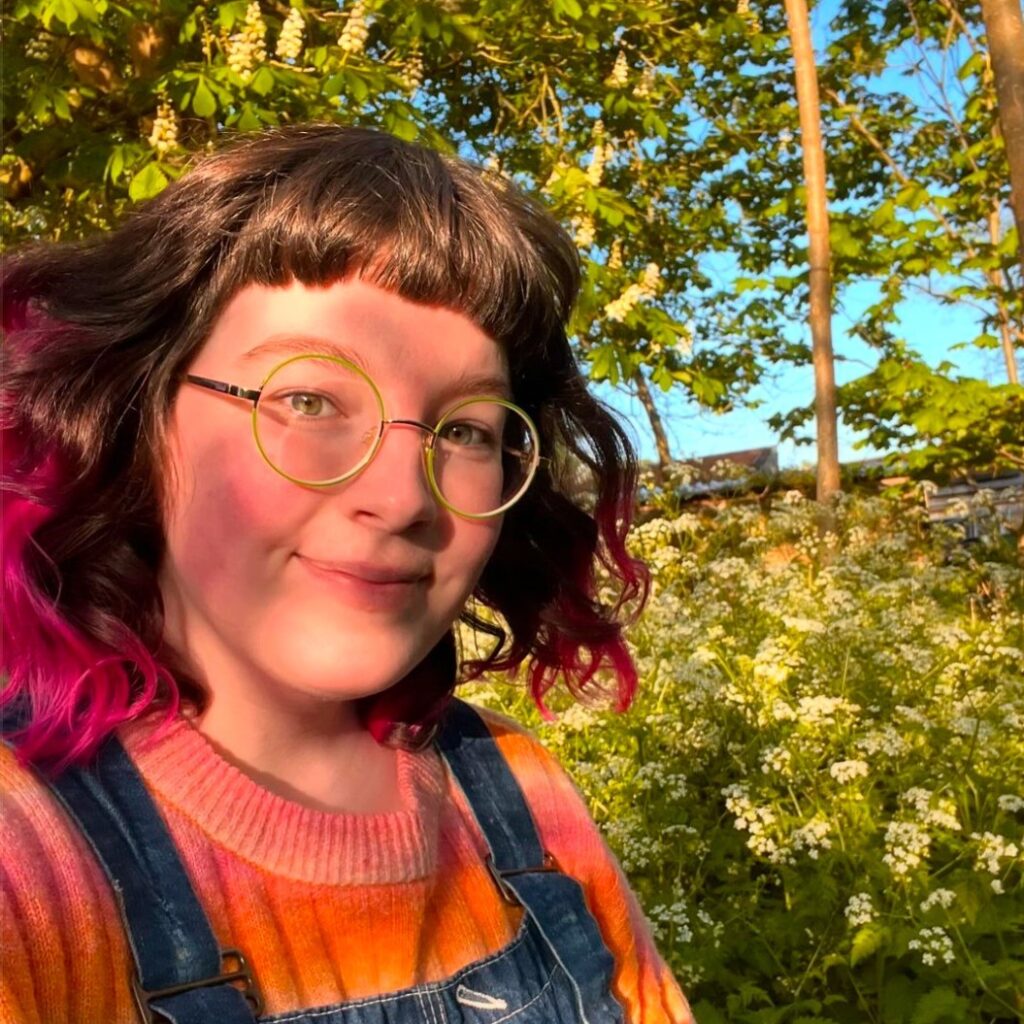
My main research area is the rapidly developing field of insect sentience and welfare, so I’m very excited (and hopeful) to see how knowledge progresses there. I’m also looking forward to further improving my identification and taxonomy skills, particularly for beetles and moths – I’d love to know more about the individual species of my favourite families! My other particular interest is burying beetles – they’re so fascinating and wonderful that I could never learn enough about them. However, I find anything insect-related fascinating, and want to learn as much as possible!
I am so grateful for the financial aid provided by the scholarship, which has greatly eased my transition into a new field of study with its accompanying equipment-related expenses. However, perhaps the greatest value for me has been the confidence and self-belief the scholarship has instilled: as a woman in STEM who last studied science at GCSE, having the RES provide such a significant vote of confidence in my abilities and potential has really helped me to courageously pursue my passions – and I will continue to do so.
I’m very interested in research – I’m considering a PhD in either insect sentience or burying beetles. However, I’d equally love to undertake conservation work or be part of positive industry change. As long as it aligns with my values and interests, I’d be happy doing anything insect-related! Unifying writing and entomology would also be wonderful – after winning a competition with my short story about insects in space (astroentomology!), I recognised the power of creative writing to educate and enthuse. Finally, working in television is a secret dream of mine – I was thrilled to recently consult on the David Attenborough documentary currently being produced, and television would be an amazing way to teach and inspire. But my greatest aspiration is simply to continue to be excited about entomology and all it entails.”
The Royal Entomological Society is committed to supporting the next generation of entomologists. We aim to provide opportunities, funding and recognition for insect scientists at every stage of their education and careers.
Simon Ward Mem.RES CEO Royal Entomological Society
The Royal Entomological Society is committed to investing in postgraduate study in insect science. We currently support three postgraduate bursaries at Harper Adams University.
The course provided by Harper Adams has a particular focus on conservation and agriculture. There is a shortage of expertise in these important fields, which is a key element in the effort to ensure global food security and the understanding of biodiversity.
A distinctive and integral feature of this MSc is the high degree of input from entomologists and ecologists in collaborating with governmental and non-governmental organisations.
The course aims to provide students with specialised training in entomology, conservation and integrated pest management. Specifically, the course will:
- Prepare students for a career in entomology and conservation
- Offer vocational training in the area of applied entomology and insect conservation
- Prepare students for PhD and further studies
The MSc covers a broad range of topics in entomology and conservation and all students receive training in fundamental skills which will enable them to enter an entomological work environment or a research career in ecological entomology or insect conservation. There is, however, considerable flexibility, enabling each student to focus on specialist subjects consistent with their interests and future career intentions.
RES Higher Education bursaries have been relaunched for 2024/2025 academic year and are now open for applications by 1 July 2024.



